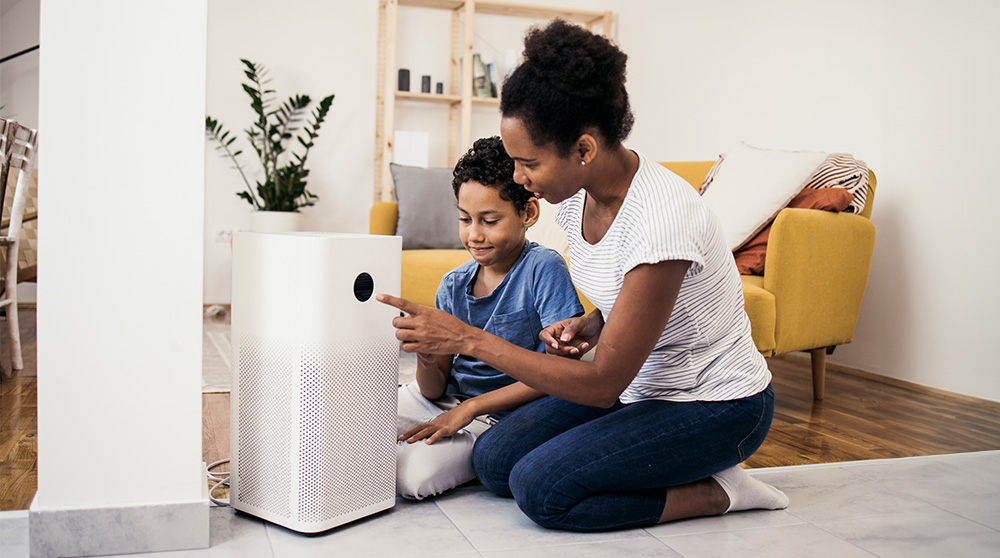The ultimate guide to a healthier home: 13 tips to follow today.

Creating a healthier home or non-toxic space doesn’t have to be overwhelming. By incorporating 13 simple, yet effective practices into your daily routine or yearly maintenance, you can foster an environment that promotes better health for the whole family.
Get your loved ones involved and start tackling these tips for a healthier home:
Declutter your spaces. Start your transformation by decluttering your living spaces. Maintaining a tidy environment not only reduces stress, but also minimizes the accumulation of dust and allergens. Reduce unnecessary clutter in your living room, bedrooms, bathrooms, playroom, and more … and consider doing it multiple times throughout the year.
Invest in an air purifier. Getting a high-quality air purifier equipped with HEPA filters can make a significant difference in removing pollutants and allergens within your home.
Give your air a natural boost. In addition to an air purifier, you can elevate your indoor environment by introducing air-purifying plants, like spider plants and peace lilies. Beyond the aesthetic appeal, greenery actively filters out indoor pollutants.
Choose safer scents. Avoid synthetic scents in candles and air fresheners. Instead, choose natural scents or essential oils to maintain a fresh ambiance.
Redecorate with VOC-free paints. Considering a fresh coat of paint? Choose products with zero or low volatile organic compounds (VOCs). These paints release fewer harmful chemicals into the air.
Monitor carbon monoxide and smoke detectors. Regularly test or change the batteries in your home’s carbon monoxide and smoke detectors. Replace any units that are more than 10 years old.
Use eco-friendly cleaning products. Transform your cleaning routine by embracing eco-friendly products that are free from harsh chemicals. Many reputable brands offer effective alternatives that not only protect your health, but also contribute to a more sustainable lifestyle.
Change filters for optimal airflow. With every changing season, change your HVAC filters. Clean filters boost air quality and the efficiency of your heating and cooling systems, reducing energy consumption.
Transition to LED bulbs. Replacing traditional light bulbs with energy-efficient LED bulbs plays a crucial role in minimizing your environmental footprint. Bonus: They also consume less energy and have a longer lifespan.
Improve water quality. Enhance your overall health by installing a water filter to purify your tap water. Remove the aerators from your faucets and do a thorough cleaning of them every six months. Call your utility company to learn more about your home’s water source.
Replace dryer sheets. Ditch traditional dryer sheets for eco-friendly alternatives, like wool dryer balls. This simple swap reduces your exposure to synthetic fragrances and harmful chemicals.
Reduce unnecessary dampness. Address dampness by improving ventilation throughout your home, using dehumidifiers and promptly fixing leaks to prevent mold growth.
Safely store your chemicals. Take precautions in storing household chemicals by placing them in well-ventilated areas, away from living spaces. Keep them out of the reach of kids and pets or secure them in a locked area so they aren’t accessible. Additionally, always dispose of hazardous materials properly.
A healthier home is possible with the help of these tips. Another great way to protect your home sweet home? Ensuring you have comprehensive protection. Talk to a local, independent agent about getting coverage or adjusting your coverage today.
This content was developed for general informational purposes only. While we strive to keep the information relevant and up to date, we make no guarantees or warranties regarding the completeness, accuracy, or reliability of the information, products, services, or graphics contained within the blog. The blog content is not intended to serve as professional or expert advice for your insurance needs. Contact your local, independent insurance agent for coverage advice and policy services.








